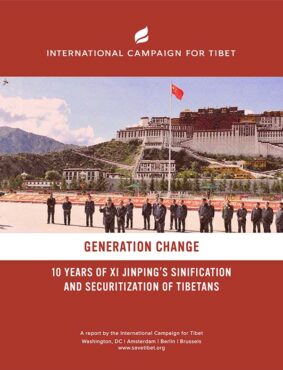Instead, to date the opposite has happened.
In a new report, the International Campaign for Tibet shows the impact Xi’s 10 years have had on Tibet, revealing how the Chinese president has securitized the Tibetan Plateau and tried to “Sinify” the Tibetan people—meaning turn them into Chinese.
“Ten years later, and contrary to certain expectations, Xi Jinping has worked to implement two primary goals: securitize Tibet and Sinify the Tibetan people in the Chinese nation-state as part of his long-term assimilationist drive. Overall, Xi has shown himself to be among the most ruthless of Chinese leaders, as he has gone on to consolidate his power to the extent of virtually making himself the leader for life,” says the report, released today, Aug. 8, 2023.
With no end in sight to Xi’s reign, the situation in Tibet might only get worse.
However, ICT says that Xi can still change the future of Tibet—and China—for the better, and other countries can pressure him to peacefully resolve the Tibet-China conflict during the Dalai Lama’s lifetime.
Xi is projected as someone who adheres to the Chinese tradition of filial piety and sees his father, Xi Zhongxun, as an inspiration. Xi senior was known to be among those advocating for a softer approach on Tibet, so Xi Jinping could and should uphold his father’s legacy on Tibet.
Read ICT’s report, “Generation Change: 10 Years of Xi Jinping’s Sinification and Securitization of Tibetans.”
10 years of Xi
Xi became the Chinese Communist Party’s general secretary in November 2012 and China’s president in March 2013.
In Tibet, the results of his reign speak for themselves:
- Due to greater security at the border, the number of Tibetans who escape as refugees plummeted from 753 in 2011 to just five in 2022.
- Tibetan self-immolations peaked in 2012, but since then, Chinese authorities have cracked down on this desperate act of protest by arresting the friends and family of self-immolators.
- Under Xi’s watch, China has subjected Tibetans to unprecedented mass DNA collection, facial recognition, artificial intelligence technology, and other advanced tools of surveillance and control.
- China under Xi is trying to eliminate Tibetans as a distinct group by forcing them to give up their language, religion and culture and assimilate as Chinese citizens.
- One of the most shocking examples is China’s vast residential school system that has separated up to 1 million Tibetan children from their families and forced them to learn in Chinese rather than their mother language.
Different from previous leaders
Xi’s rule in Tibet has signaled a change in ideology for the CCP.
While earlier Communist leaders were also brutal to Tibetans, China had an official policy of ethnic autonomy that gave some freedom to Tibetans and other non-Chinese groups to retain their unique cultures.
But when Xi took over, he embraced a new hardline approach of ending ethnic autonomy and forcing so-called “minority” groups to assimilate into a unified Chinese nation.
Under this approach, China is now trying to “Sinify” Tibetans, meaning remake them as Chinese citizens who speak Mandarin, have “Chinese consciousness” and follow the CCP.
As a result, Xi’s China has cracked down severely on Tibetans’ religion, language and loyalty to the Dalai Lama. His administration formally launched an online database of CCP-approved Tibetan Buddhist reincarnations, officially designated as “authentic Living Buddhas” of Tibetan Buddhism, in January 2016. The database was a clear effort by the CCP to assert control over the Dalai Lama’s reincarnation and undermine the authority of legitimate Tibetan religious leaders.
Family connection to Tibet
While the destruction of Tibetans’ way of life is only increasing, ICT’s report finds hope in Xi’s past.
Xi is the son of Xi Zhongxun, one of the CCP’s leaders when China invaded and began occupying Tibet in the 1950s.
The elder Xi was seen as a reformer who recognized China’s mistakes in Tibet. He developed a personal relationship with the Dalai Lama and argued for moderate policies toward the Tibetan people.
Filial piety is important in Chinese culture, and Xi Jinping is said to hold his late father in high regard.
Xi’s mother Qi Xin is also believed to be Buddhist, and his wife Peng Liyuan reportedly has a Tibetan Buddhist master.
Recommendations
ICT’s report says Xi has the chance to uphold his family’s legacy by working to bring a peaceful end to the conflict between Tibet and China.
The report also calls on outside governments to pressure Xi and the Chinese government to engage the Dalai Lama’s envoys in direct, substantive dialogue without preconditions.
Specifically, the United States should pass the Promoting a Resolution to the Tibet-China Conflict Act, a bipartisan bill that will push Beijing to get back to the negotiating table. Other countries should consider taking up similar policy positions.


